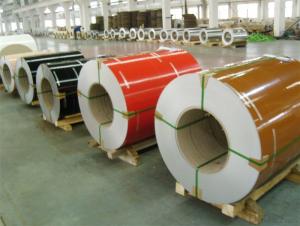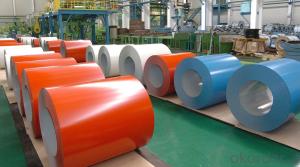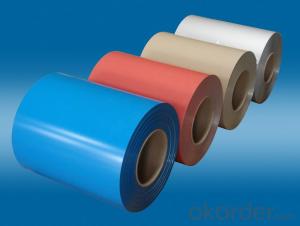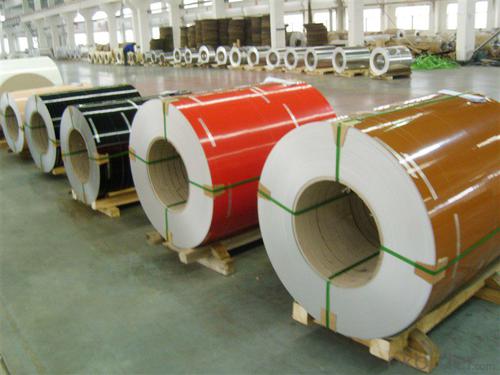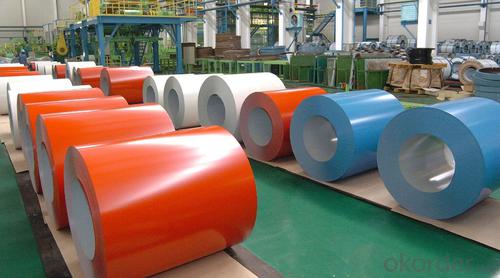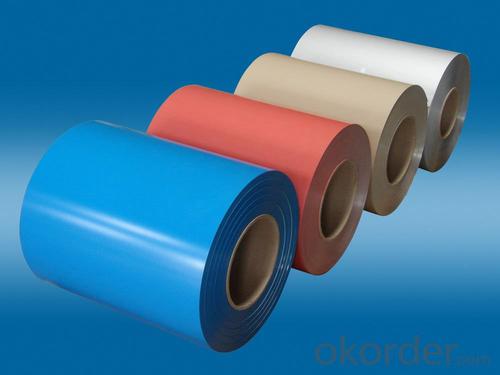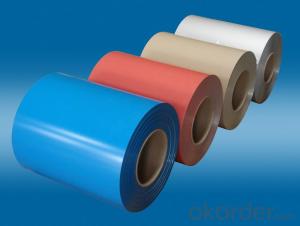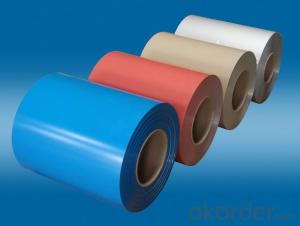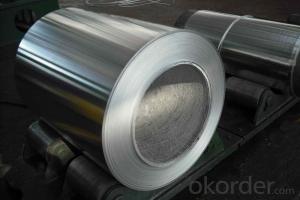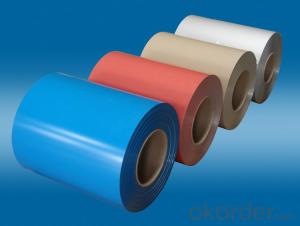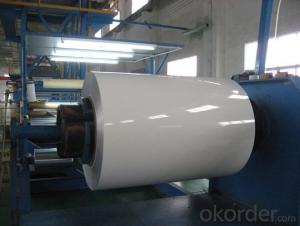1050 Aluminum Sheet Coil - AA3105 Prepainted Aluminum Coils for Construction
- Loading Port:
- Shanghai
- Payment Terms:
- TT OR LC
- Min Order Qty:
- 5 m.t.
- Supply Capability:
- 10000 m.t./month
OKorder Service Pledge
OKorder Financial Service
You Might Also Like
Specification
1.Structure of AA3105 Prepainted Aluminium Coils Used for Construction Description
AA3105 Prepainted Aluminium Coils Used for Construction are of a wide range of colors, which give wonderful appearance no matter in residential and commercial constructions or great exhibition centers.
AA3105 Prepainted Aluminium Coils Used for Construction have been widely used in the fields of construction and decoration, electronic applications, lighting decoration, air-condition air pipes, sandwich panels and drainages etc.
2.Main Features of AA3105 Prepainted Aluminium Coils Used for Construction
• Superior quality of raw material
• Reasonable and stable chemical composition
• Accurate tolerance
• Goode mechanical property
3.AA3105 Prepainted Aluminium Coils Used for Construction Images
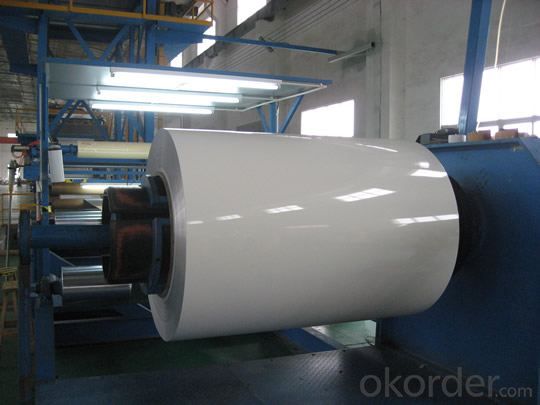
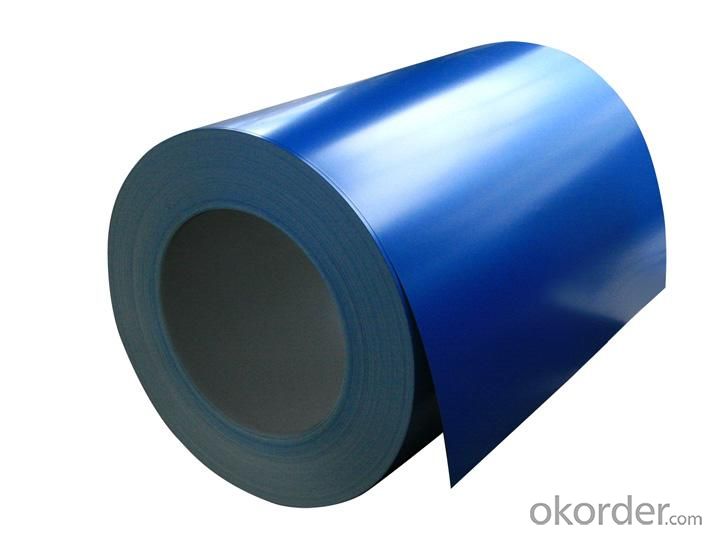
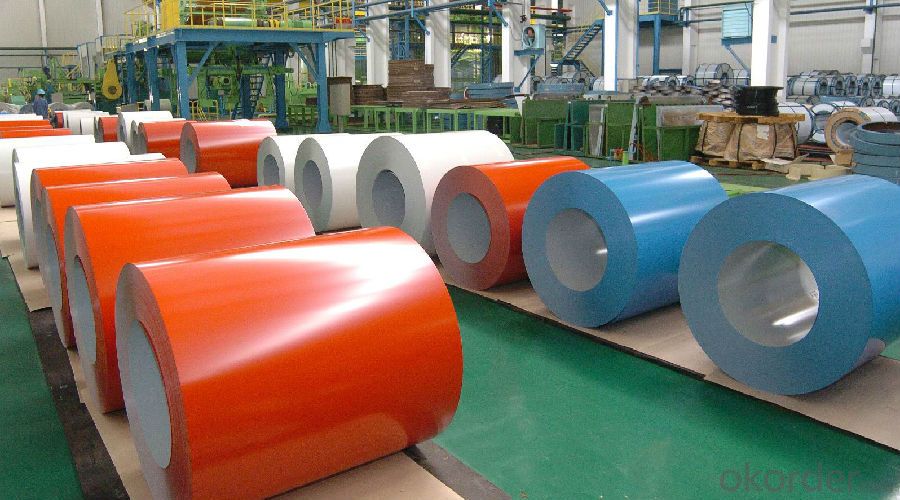
4.AA3105 Prepainted Aluminium Coils Used for Construction Specification
Alloy | AA3105 |
Temper | H14,H16,H18,H22,H24,H26,H32,O/F |
Thickness | 0.03mm-3.0mm |
Width | 30mm-1700mm |
Coating | PE,PVDF,Epoxy |
Painting Thickness | Standard 16-25 Mic, max 40 Mic |
Color | According to RAL colors or customers' samples |
Standard | GB/T 17748-1999 |
5.FAQ:
What is the quality standard?
---Usually our standard is GB3880-2006
What is the largest width?
---It is 2000mm
What is the MOQ?
---Usually we can accept 80 tons.
- Q: How do aluminum coils contribute to energy-efficient appliances?
- Aluminum coils play a key role in enhancing the energy efficiency of appliances. The use of aluminum in coil form allows for efficient heat transfer, which is essential for appliances that require cooling or heating mechanisms. Firstly, aluminum coils have excellent thermal conductivity. This means that they can quickly absorb and dissipate heat, resulting in more efficient cooling or heating processes. This is especially important in appliances such as refrigerators, air conditioners, and heat pumps, where effective heat transfer is crucial for maintaining the desired temperature. Moreover, aluminum coils are lightweight yet durable, making them an ideal choice for energy-efficient appliances. The lightweight nature of aluminum reduces the overall weight of the appliance, which leads to lower energy consumption during transportation and installation. Additionally, the durability of aluminum ensures a longer lifespan for the appliance, reducing the need for frequent maintenance or replacement. Furthermore, aluminum is highly resistant to corrosion, which is a common issue in appliances that involve contact with water or moisture. By using aluminum coils, manufacturers can ensure the longevity and reliability of the appliance, thus contributing to energy efficiency by reducing the need for repairs or replacements. Lastly, aluminum is a highly recyclable material. Using aluminum coils in appliances promotes sustainability and reduces the environmental impact. By choosing energy-efficient appliances that incorporate aluminum coils, consumers can support the circular economy and contribute to a more sustainable future. In conclusion, aluminum coils greatly contribute to the energy efficiency of appliances. Their excellent thermal conductivity, lightweight yet durable nature, corrosion resistance, and recyclability make them an ideal choice for enhancing the performance and sustainability of energy-efficient appliances.
- Q: Can aluminum coils be used in automotive heat exchangers?
- Yes, aluminum coils can be used in automotive heat exchangers. Aluminum is a popular choice for heat exchangers in the automotive industry due to its excellent thermal conductivity, lightweight nature, and resistance to corrosion. These properties allow aluminum coils to efficiently transfer heat from one fluid or gas to another, making them ideal for use in automotive heat exchangers. Additionally, aluminum coils are also easy to manufacture and can be formed into various shapes and sizes, further enhancing their suitability for automotive applications.
- Q: Are aluminum coils suitable for electrical transformers?
- Yes, aluminum coils are suitable for electrical transformers. Aluminum is a lightweight and cost-effective material that offers several advantages for transformer construction. It has excellent electrical conductivity, comparable to copper, which allows for efficient power transfer. Additionally, aluminum coils have lower resistance than copper coils, resulting in reduced power losses and improved energy efficiency. The use of aluminum coils in transformers also contributes to weight reduction, making them easier to handle and transport. However, aluminum coils require larger cross-sections compared to copper coils due to their slightly lower conductivity. This means that transformers using aluminum coils may be slightly larger in size. Overall, aluminum coils are a viable and widely used alternative to copper coils in electrical transformers, offering cost savings, high conductivity, and improved energy efficiency.
- Q: Are there any specific certifications or qualifications required for aluminum coil suppliers?
- Certifications and qualifications that are essential for aluminum coil suppliers do exist. The ISO 9001 certification is a vital one for these suppliers as it guarantees the implementation of a quality management system and adherence to international quality standards. When a supplier possesses this certification, it demonstrates their effective quality control processes, consistent product performance, and ability to satisfy customers. Another critical qualification for aluminum coil suppliers is the AS9100 certification, particularly for those serving the aerospace industry. This certification verifies that the supplier has fulfilled the industry-specific requirements for quality management systems, including rigorous quality control, traceability, and compliance with industry standards. Moreover, aluminum coil suppliers may also need to conform to industry-specific standards like the ASTM standards or the REACH regulations of the European Union concerning chemical substances. These standards ensure that the supplier's products fulfill the necessary specifications and are safe to use in various applications. Furthermore, certain aluminum coil suppliers may possess specialized certifications or qualifications tailored to specific industries or applications. For instance, suppliers serving the automotive industry may hold certifications like the IATF 16949 certification, which demonstrates their ability to meet the demanding requirements of automotive manufacturers. In conclusion, while the specific certifications and qualifications required may vary depending on the industry and application, it is crucial for aluminum coil suppliers to possess certifications like ISO 9001 and industry-specific certifications to ensure their products meet the required quality standards and comply with relevant regulations.
- Q: This question asks for the current prices of aluminum coil in various regions around the world.
- <p>The price of aluminum coil can vary significantly based on factors such as market demand, supply, transportation costs, and regional economic conditions. Prices are typically quoted per metric ton and are influenced by the London Metal Exchange (LME) and regional metal exchanges. For the most accurate and up-to-date prices, it's best to consult with local metal suppliers or check online commodity trading platforms. Prices can change daily, so real-time data is essential for making informed decisions.</p>
- Q: What are the common surface treatments for aluminum coils in the construction industry?
- The common surface treatments for aluminum coils in the construction industry include anodizing, painting, and powder coating. Anodizing creates a protective oxide layer on the surface, enhancing corrosion resistance. Painting provides aesthetic appeal and additional protection against environmental elements. Powder coating offers a durable and decorative finish by applying a powder coating material electrostatically and then curing it in high heat.
- Q: Can aluminum coils be used in high-altitude environments?
- Yes, aluminum coils can be used in high-altitude environments. Aluminum is a lightweight and corrosion-resistant material, making it suitable for various applications, including in high-altitude environments. Aluminum coils are commonly used in air conditioning systems, heat exchangers, and refrigeration units, which can function efficiently at high altitudes. Aluminum's high strength-to-weight ratio allows it to withstand the extreme conditions found at high altitudes, including low temperatures, high winds, and low atmospheric pressure. Additionally, aluminum is non-magnetic, which is advantageous in certain high-altitude applications, such as aerospace and satellite technologies. Furthermore, aluminum has excellent thermal conductivity, allowing it to efficiently transfer heat, making it ideal for use in cooling systems operating in high-altitude environments. Its corrosion resistance properties also make it durable and able to withstand the effects of moisture, which can be prevalent in such environments. Overall, aluminum coils are a reliable and suitable choice for use in high-altitude environments due to their lightweight, corrosion resistance, thermal conductivity, and strength.
- Q: This question asks for the method to determine the weight of a steel coil.
- <p>To calculate the weight of a steel coil, you need to know its length, width, and thickness, as well as the density of the steel material. The formula to calculate the weight is: Weight = (Length 脳 Width 脳 Thickness) 脳 Density. The density of steel is approximately 7850 kg/m鲁. Convert the dimensions to meters if they are not already in that unit. Multiply the volume (length 脳 width 脳 thickness) by the density to get the weight in kilograms. For example, if a coil is 2 meters long, 1 meter wide, and 0.005 meters thick, its weight would be (2 脳 1 脳 0.005) 脳 7850 = 78.5 kg.</p>
- Q: just wondering if you can weld aluminum pipe to a metal pipe for a cars exuast
- i don't see why not becasue volvo uses aluminum exhaust systems.
Send your message to us
1050 Aluminum Sheet Coil - AA3105 Prepainted Aluminum Coils for Construction
- Loading Port:
- Shanghai
- Payment Terms:
- TT OR LC
- Min Order Qty:
- 5 m.t.
- Supply Capability:
- 10000 m.t./month
OKorder Service Pledge
OKorder Financial Service
Similar products
Hot products
Hot Searches
Related keywords
